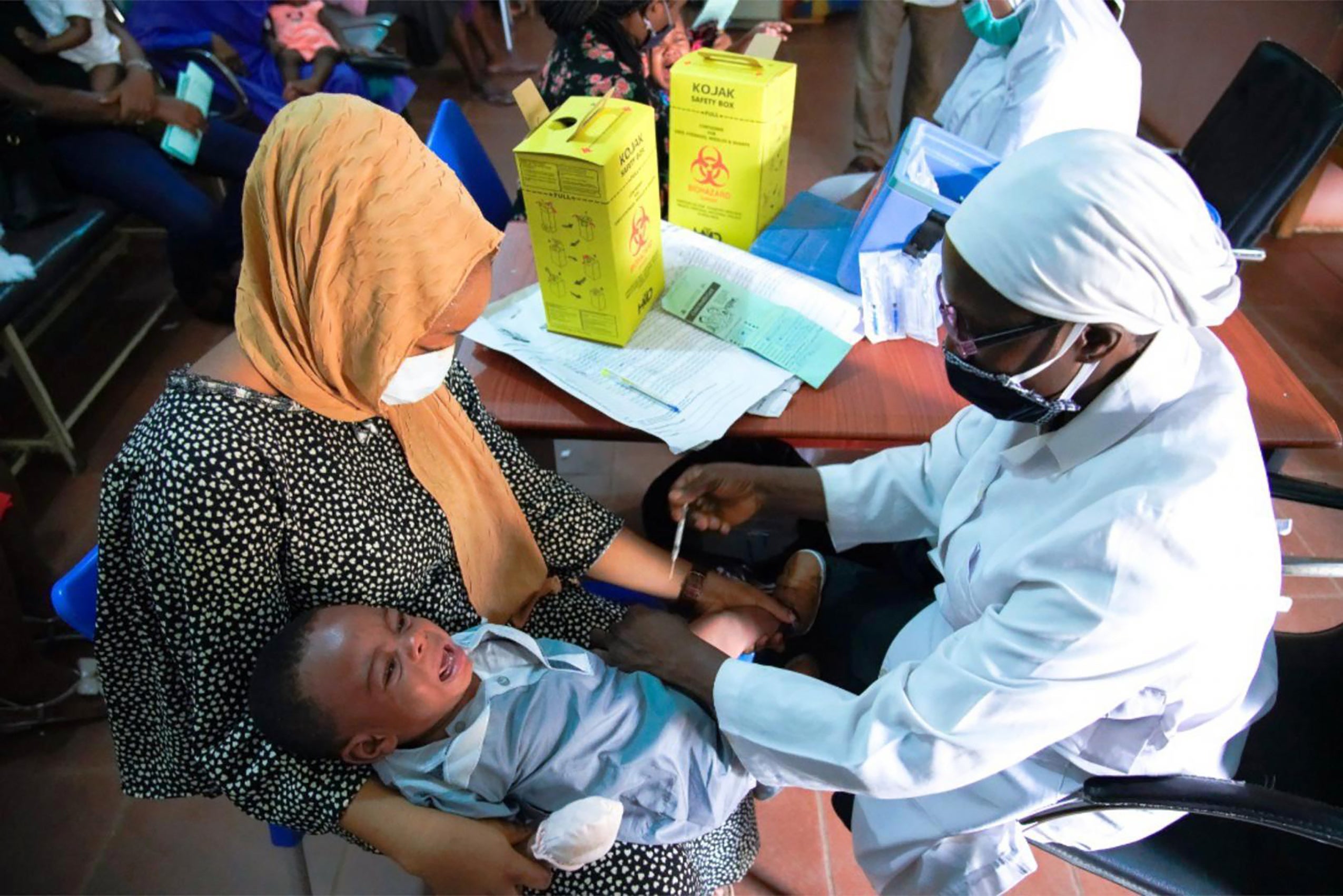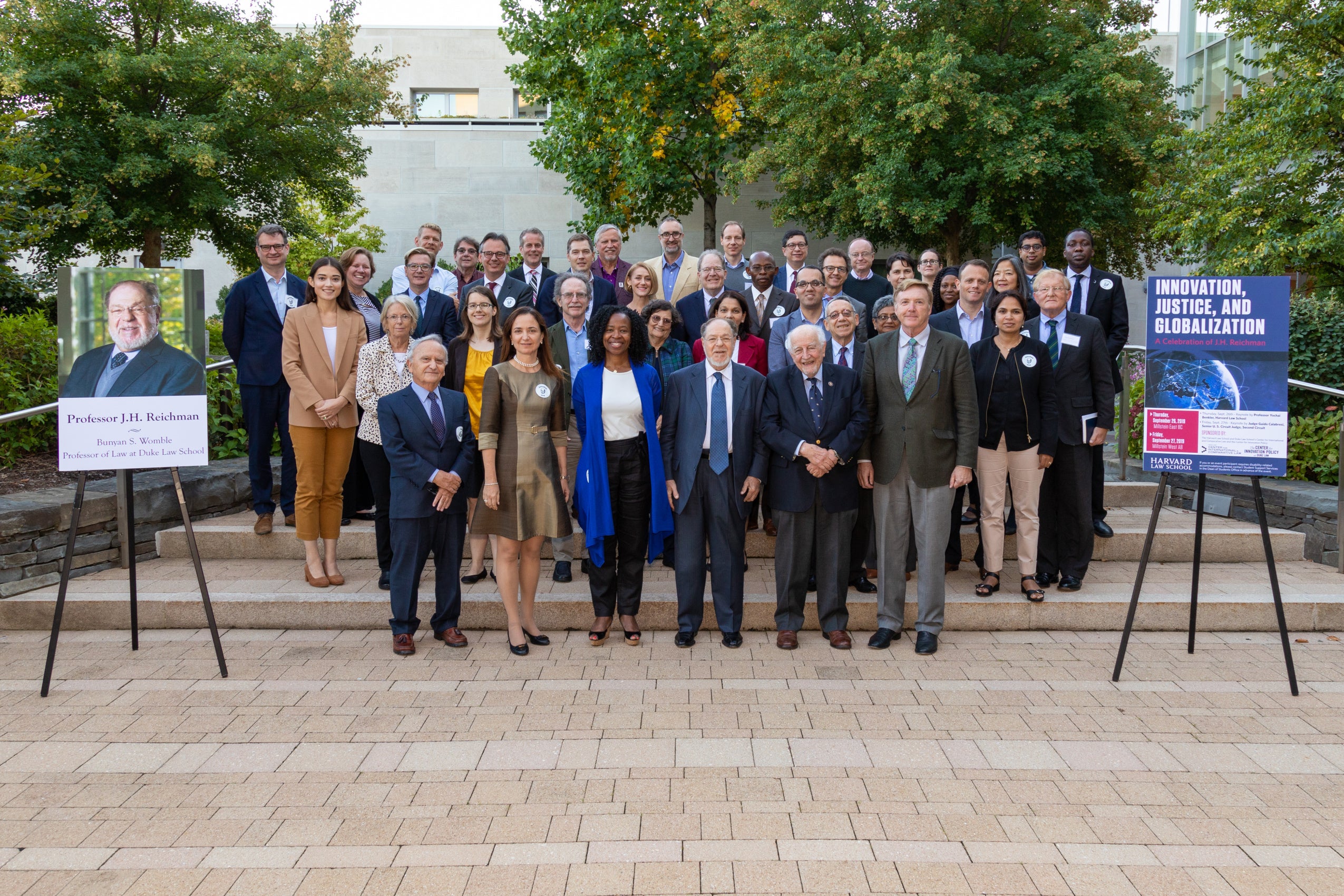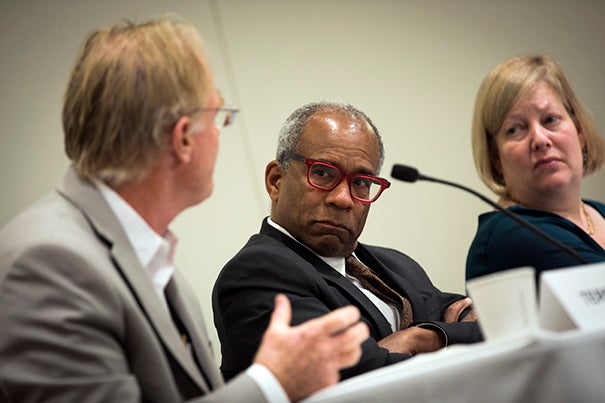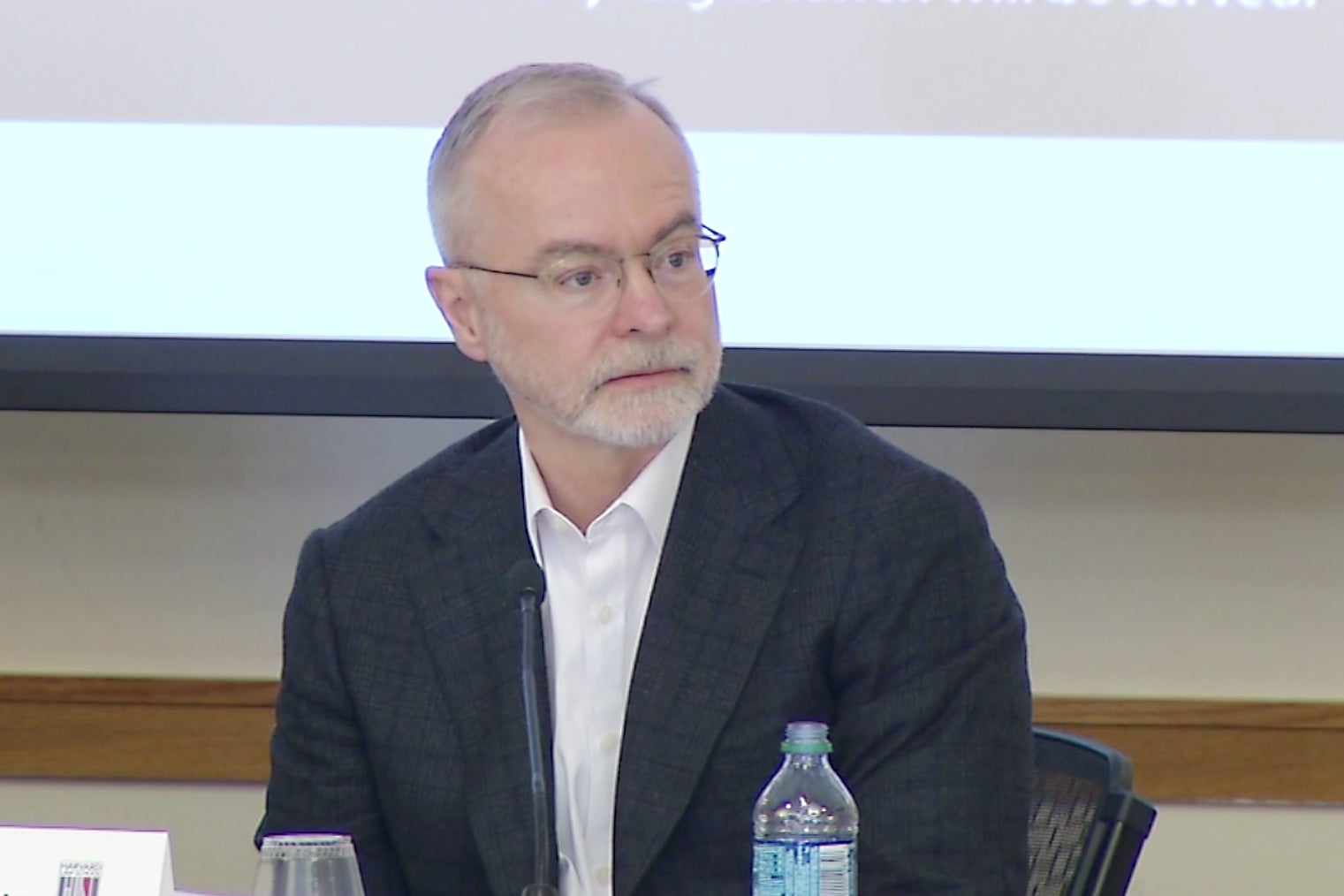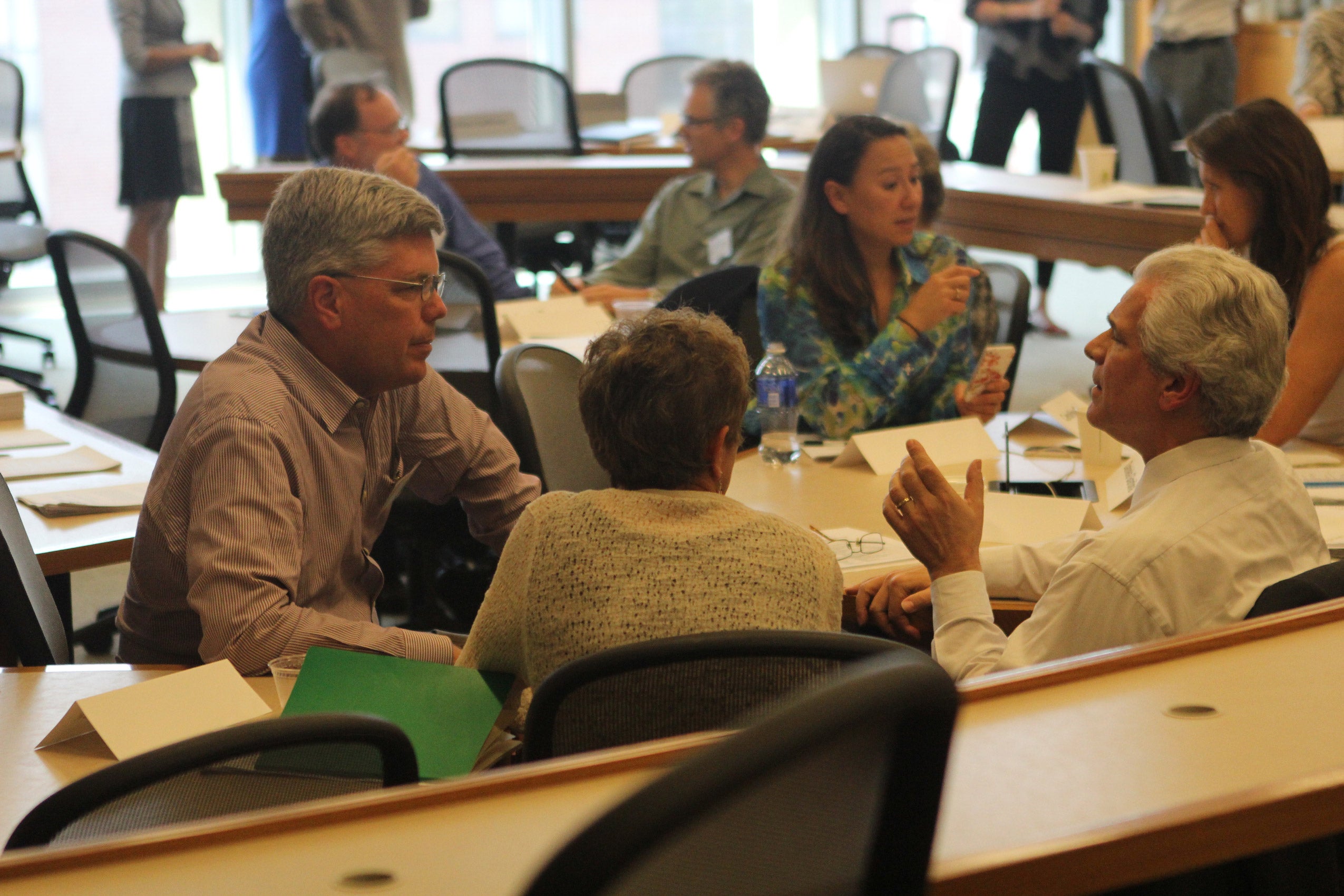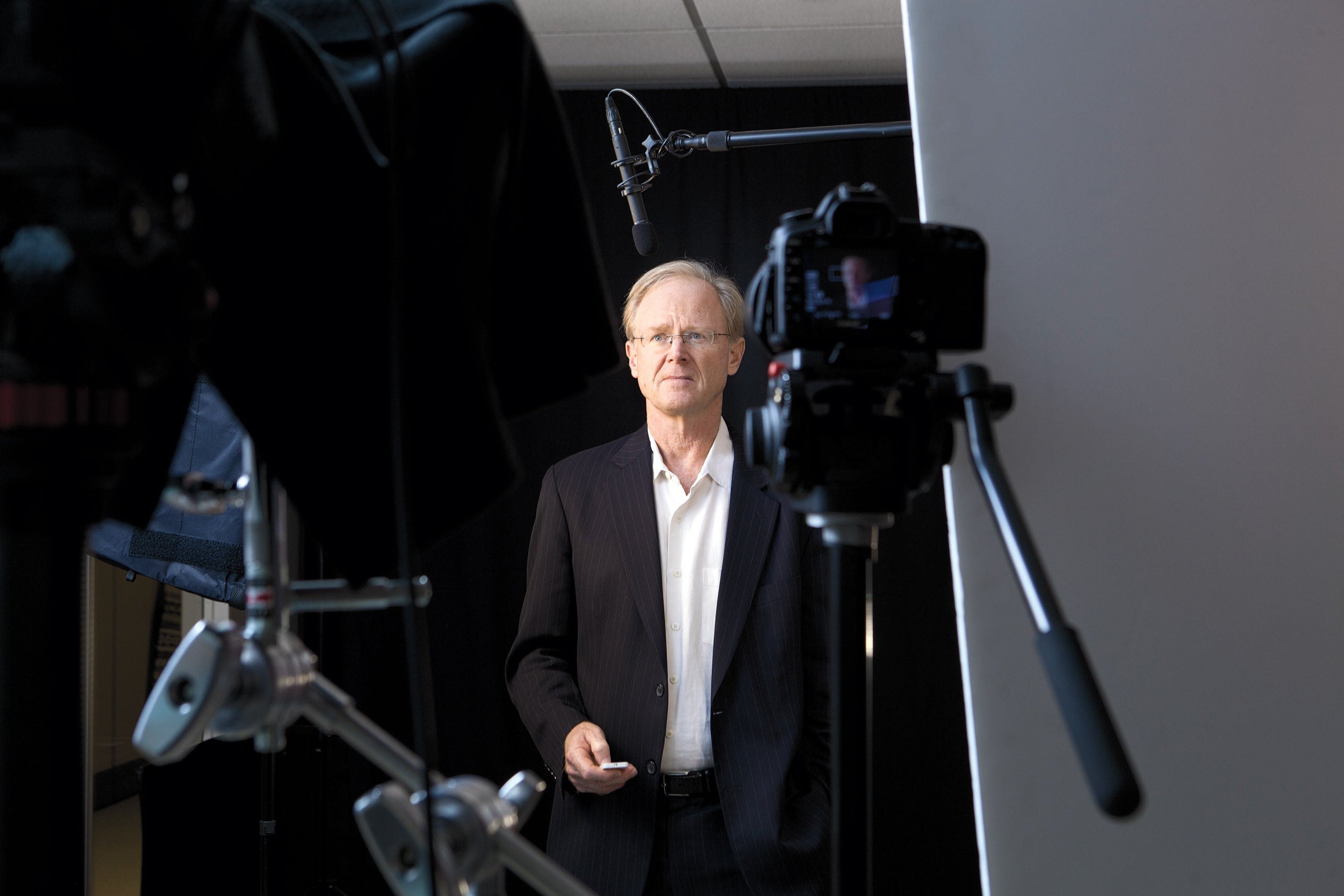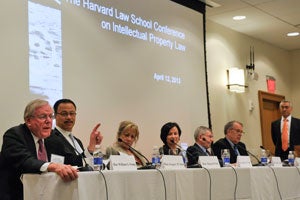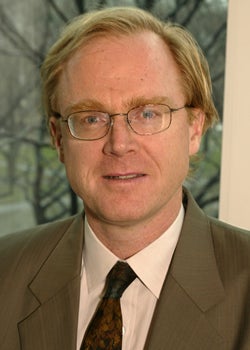People
William Fisher
-
Innovation, Justice and Globalization
October 17, 2019
The “Innovation, Justice and Globalization” conference, hosted by HLS professor and leading intellectual property scholar Ruth Okediji, brought international academics and policymakers to campus to discuss intellectual property issues.
-
Amid a Flurry of “Cultural Appropriation” Claims Aimed at Carolina Herrera, What is Going on (Legally)?
June 17, 2019
The Mexican government has lodged a “cultural appropriation” complaint against Carolina Herrera for its use of indigenous patterns and textiles in its Resort 2020 collection. Garments from the New York-based brand’s latest collection that “feature a traditional flower embroidery known as ‘istmo de Tehuantepec,” as well as those with “a colorful ‘Saltillo Sarape’ stripe pattern” have led the Mexican culture ministry and the fashion media, alike, to call foul. But legal experts suggest there is more to consider here...“In some countries, courts have construed existing intellectual property laws to establish modest limitations on uses of traditional knowledge,” according to William Fisher, a professor of intellectual property at Harvard Law. For instance, “Australian courts have ruled that the importation and sale of carpets bearing images derived from motifs developed by Aboriginal groups violated Australian copyright law.” Other countries, he notes, such as Philippines and Guatemala, “have created sui generis regimes that [exclusively] govern traditional knowledge.”
-
These celebrity dance creators think ‘Fortnite’ should pay them for their moves. The courts may disagree.
December 19, 2018
They say to dance like no one's watching. But what if millions are watching an avatar of you dance and someone else is making billions from it without your permission? That's the intriguing question at the heart of lawsuits from several dance creators who say that the massive video game "Fortnite" is profiting off their their moves. ... Harvard Law School professor William W. Fisher, who teaches a course on intellectual property law, said in an email that choreography lawsuits don't often make it into court. "Egregious instances of copyright are usually addressed through shaming, not law," he said.
-
Thurgood Marshall: The soundtrack of their lives
October 2, 2017
Thurgood Marshall is revered as a titan of the U.S. Civil Rights Movement, the architect of the landmark court case that ended legal segregation in America’s public schools, and the first African-American Supreme Court justice. Yet for five of his former law clerks gathered Wednesday at Harvard Law School (HLS), he was more than that. For Mark Tushnet, William Nelson Cromwell Professor of Law, Marshall was a messenger of hope and courage to African-Americans who endured the injustices of the Jim Crow South...For Randall Kennedy, Michael R. Klein Professor of Law, who clerked for Marshall in the ’80s, the associate justice was a source of pride, lifting the spirits and the consciousness of black Americans who were treated as second-class citizens...For Martha Minow, former dean of Harvard Law School, Carter Professor of General Jurisprudence, and University Distinguished Service Professor, who also clerked for Marshall, he was the embodiment of a deep commitment to social justice and faith in the power of the rule of law to bring equal rights to all eventually...The panel was moderated by Tomiko Brown-Nagin, Daniel P.S. Paul Professor of Constitutional Law, director of the Charles Hamilton Houston Institute for Race & Justice, and professor of history in the Faculty of Arts and Sciences, and Kenneth Mack, the Lawrence D. Biele Professor of Law...“He was a formidable person in all respects,” recalled another former clerk, William Fisher, WilmerHale Professor of Intellectual Property Law and faculty director of the Berkman Klein Center for Internet & Society...Carol Steiker, Henry J. Friendly Professor of Law and Special Adviser for Public Service, said she developed a lifelong interest in death penalty law during her clerkship with Marshall.
-
Thurgood Marshall: The soundtrack of their lives
September 29, 2017
Thurgood Marshall is revered as a titan of the U.S. Civil Rights Movement, the architect of the landmark court case that ended legal segregation in America’s public schools, and the first African-American Supreme Court justice. Yet for five of his former law clerks gathered Wednesday at Harvard Law School, he was more than that.
-
Law Schools Are Going Online to Reach New Students
June 23, 2016
Law schools, in the face of marked declines in enrollment, revenue and jobs for graduates, are beginning to adopt innovative new ways of delivering legal education. Some law schools are moving away from relying solely on classic settings and instead are blending classroom learning with online instruction...To attract new and broader audiences, she advised law schools to categorize offerings by subject matter rather than by course or by degree program. One example is a copyright law course developed in conjunction with Harvard Law School. In addition to law students, roughly 500 other people have been attracted to the online course, which is offered in the spring semester and was developed by Harvard using existing technology. The course allows both categories of students to interact via weekly webcasts featuring guest speakers and an online discussion forum, according to Prof. William W. Fisher, known as Terry, who teaches the course, which is also licensed to 18 universities worldwide to generate revenue.
-
In his latest book, 'A World of Struggle: How Power, Law, and Expertise Shape Global Political Economy,' Professor David Kennedy points to widespread uncertainty and ambivalence about the world and explores 'the role of expertise and professional practice in the routine conflicts through which global political and economic life takes shape.'
-
Harvard Law and Global Access to Drugs
April 4, 2016
Across HLS, faculty are focusing on international access to lifesaving drugs for underserved populations. One forthcoming book, “The Health Crisis in the Developing World and…
-
... Adding to the irony, the blocked lecture, which explains aspects of copyright law as it applies to music and licensing, is taught by William “Terry” Fisher, a noted copyright expert who is the WilmerHale Professor of Intellectual Property Law at Harvard Law School. “This was an annoyance last week for my Harvard Law School students and the 400 students from around the world taking the online class,” said Fisher. “But it’s also having a global impact because students enrolled in affiliated courses at universities and cultural institutions in other countries that use the same lectures and readings and are on a different academic schedule now are finding they can’t get access.”
-
Sony Music Issues Takedown On Copyright Lecture About Music Copyrights By Harvard Law Professor
February 17, 2016
Oh, the irony. First pointed out by Mathias Schindler, it appears that a copyright lecture about music copyright done by famed copyright expert and Harvard Law professor William Fisher has been taken down due to a copyright claim by Sony Music. ... Let's be clear here: this is unquestionably fair use. It's not entirely clear to me if this was an explicit takedown or merely a YouTube ContentID match, but either way there is no reason for YouTube to have allowed this to be blocked.
-
Global Access in Action (GAiA), an initiative of the Berkman Center for Internet and Society at Harvard, hosted a workshop on July 10 to explore lessons from the recent Ebola outbreak for improving future preparedness for public health crises.
-
EdX marks the spot
May 28, 2015
In 2013, Jennifer Chung was working as a software engineer in Seattle when she decided to take CopyrightX, an online legal course offered through Harvard’s edX collaboration with other universities. Now she’s a second-year student at Harvard Law School...CopyrightX is offered to different student populations in different ways. For instance, the in-person version of the course is offered in a traditional classroom to HLS students. The online version, which is taught in parallel with the campus course, has been offered since edX began in 2012. The third, hybrid version of the course began almost by accident, according to William Fisher, the WilmerHale Professor of Intellectual Property Law, the course’s main instructor. That first year, he said, a former student asked if she could use the CopyrightX material to teach a parallel course to her students in Jamaica. Fisher agreed. During the course’s second year, instructors at 10 institutions around the world offered it, combining their own in-class instruction with CopyrightX’s online lectures and reading materials. This year, the number of affiliated courses grew to 18, at institutions from Australia to Africa to the Middle East to Europe to the Caribbean to South America.
-
Berkman Center announces leadership transition
April 18, 2014
The Berkman Center for Internet & Society has announced a significant leadership transition as Professor William (Terry) Fisher steps down after 12 years as Chair of the Board of Directors and Professor Jonathan Zittrain, the co-founder of the Berkman Center and Vice Dean for Library and Information Resources at Harvard Law School, assumes the role. The change will be effective as of July 1, 2014.
-
For Harvard Law School’s recipients of the Cravath International Fellowship, January’s three-week winter term is a chance to immerse themselves in an academic project with an international, transnational, or comparative law focus. The experiences of three students illustrate the range and depth of the projects students pursue.
-
Back to the Future: CopyrightX’s data driven sequel
January 21, 2014
Last spring semester, Harvard Law School Professor and Berkman Center for Internet & Society Faculty Director William Fisher debuted CopyrightX, a free, online, noncredit course that explores copyright law. The course is being offered again this semester, improving on its unique format thanks to student feedback and data from last year.
-
IP experts and judges convene at HLS to discuss developments in intellectual property laws
July 4, 2013
The biennial Harvard Law School Conference on Intellectual Property Law attracted scores of IP lawyers, business people, academicians, and judges to the school April 12 to discuss recent developments in IP law.
-
CopyrightX, the new, experimental, Web-based Harvard Law School course which prioritizes the human dimension of online teaching, is the brainchild of Professor Terry Fisher, who is committed to what he calls the democratization of higher education.
-
HLS debuts first online course
January 31, 2013
Harvard Law School’s first ever online course launched Monday, opening up “Copyright,” a class taught by Law School professor William W. Fisher, III, to hundreds of people worldwide. HLS1x: “Copyright,” which is offered through the Harvard branch of the online learning platform edX, is closely modeled after the Law School course taught by Fisher since 1994.
